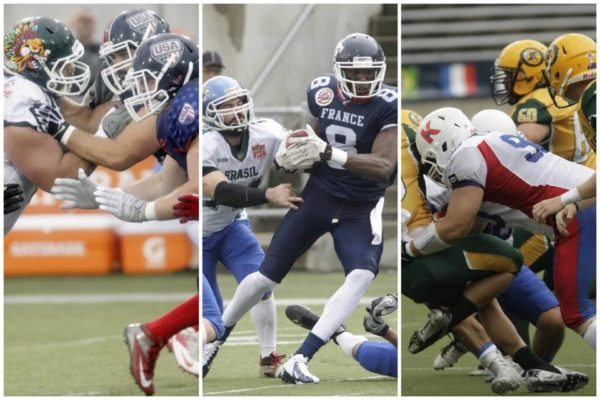The dust has settled after the first round of games in Canton. The 2015 IFAF World Championship Thursday line-up was held under overcast skies and between intermittent downpours. This, or the mid-week daytime schedule, kept the affair intimate as only a handful of supporters were in the stands before the headlining USA v. Mexico match at 7:30pm.
Friday’s schedule at Walsh University, the “international village” residence and practice site for seven countries’ national teams, was one of walk-thrus and film breakdown. Most nations forego the shoulder pads, doing their field work in helmets and recovering from the previous day’s battle.
This tournament is a logistically unique event in the American football world. Organizers and coaches have been tasked with pulling together athletes from different clubs and universities into one cohesive unit in a very short period of time. That means evaluating talent, installing schemes, and building a game plan.
USA had only had a week and half together as a team, and faced non-American foes only in a joint practice with Australia a week ahead of the tourney. Head coach Dan Hawkins said the team had not hit full contact as a unit before Thursday’s night match against Mexico.
France had three weekend camps in the spring and early summer to build their roster and for head coach Patrick Esume to install his offense. The team played no exhibition matches pre-Canton and this may be why the French racked up 15 penalties for 257 yards against Australia.
Brazil QB Rhudson Fonseca, who lives in the US, learned offensive coordinator Brian Guzman’s offense stateside before meeting up with the Oncas shortly before the tourney began.
Australia might be the nation whose spent the most time together, but mainly because the 14-hour flight and financial investment to travel for the tournament was justified by a longer pre-tourney schedule on US soil.
Compile those variables with the compressed schedule. A few of these nations will play four games in 10 days. The most any NFL or NCAA team could play in that time-frame is two. How are the nations coping?
Korea lost their quarterback Tae Hoon to injury in the second half of their game against Australia and relied heavily on running back Hong Duck. We are unsure the status Tae Hoon, but this will heavily influence Korea’s weekend adjustments.
France gave Brazil a rude welcoming to the Onças when wide receiver Anthony Dablé returned the opening kick an IFAF-record 102 yards, the first of France’s 24 unanswered points in the first half. Brazil’s safety Cleverson de Freitas said the defensive made some adjustments on the field Thursday and we able to hold the explosive ‘Les Bleus’ to a single score in the second half.
USA’s Hawkins is going to concentrate on the details; hand/eye placement, depths, and splits. He believes, with the short layover between games, concentrating on doing what the USA does best will have the Americans prepared for Japan on Sunday night.
France’s Esume thinks his IFAF veterans give them on edge on recovery. Brazil game MVP wide reciever Guilluame Rioux, quarterback Paul Durand, linebacker Giovanni Nanguy, and Dablé all played in the 2011 Austria championships and know how to handle the quick turnaround.
Regardless of the challenges to staging a tournament of this nature, all challenges are shared by the nations. Expect teams to improve drastically game over game as they spend more time together.
Read more about our predictions on how these countries may improve in our Friday notes.
Sunday schedule starts with Brazil v. South Korea at noon, followed by France v. Australia at 3:30, and capped by USA v. Japan. All times are EDT.
All twelve games will be broadcast live and streamed globally on ESPN3 in the United States, on ESPN International broadband channels where available, and at BigTimeSports.com.

